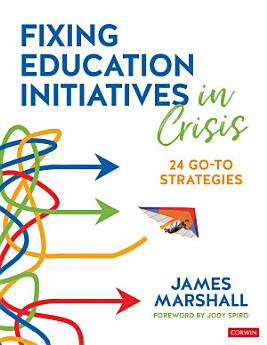Fixing Education Initiatives in Crisis: 24 Go-to Strategies
About this ebook
Insufficient planning, unclear outcomes, missing data--for leaders overseeing education initiatives, it can often seem like there′s a crisis around every corner. Drawing on decades of experience in assessment, evaluation, and data-driven decision-making, author and Professor of Educational Leadership James Marshall offers a combination of evidence-based practices and real-life experiences that provide practical solutions to the diverse challenges school leaders encounter as they implement new initiatives.
Exploring oft-encountered challenges such as poor outcomes, waning interest or support from leadership, public relations issues, scaling and sustainability roadblocks, and other implementation-related obstacles--the book identifies six types of crises confronted by education leaders and offers valuable insights and solutions for each. Features include:
- Guidance to recognize the six types of education initiative crises and strategies for resolution tailored to each type
- 24 unique tools to positively impact challenges, such as the "Triage Tool" to prioritize crisis intervention and the "Don’t Swamp the Boat" tool to explore the complement of initiatives in your school
- Two case studies and real world examples illustrating the application of selected tools across a range of crisis types
Whether you’re an education leader dealing with a program or initiative in crisis or proactively looking to prevent a crisis, Fixing Education Initiatives in Crisis provides practical solutions to navigate troubled initiatives and guidance for the design and implementation of healthy initiatives that yield predictable results.
About the author
James Marshall’s lifelong work lies at the intersection of people and the organizations in which they work—and optimizing the synergy that fertile convergence holds. His scholarship, teaching, and consulting combine our understanding of human performance and organization development to assess strengths, devise strategy, and improve even the most vexing of challenges. Engagements have found him doing everything from evaluating virtual reality delivered training for active shooter containment, to devising strategy that improved the community-focused impacts realized by the national network of over 150 public television stations. He is currently Professor of Educational Leadership at San Diego State University, in the #1 ranked California State University College of Education. In his private practice, he serves as a thought partner to leaders seeking to hasten the collective impact of their organization’s investments—especially their human resources. From assessing strengths and needs to conceptualizing strategy and initiatives and then measuring return on investment, Dr. Marshall’s unique approach relies on a proven mix of assessment and evaluation, appreciative inquiry, and empathic understanding that predictably yields quantifiable results. Clients particularly note his ability to use data—with novelty and persuasion—to drive change. With over 200 publications to his credit, Dr. Marshall’s scholarship encompasses a diverse range of works that includes empirical research, program evaluation efforts, and policy development. His program evaluation endeavors are particularly significant and include over 250 individual studies of funded projects and program investments totaling more than $120 million dollars. This work has been funded by diverse agencies that include the National Science Foundation, the National Endowment for the Humanities, the Institute for Library and Museum Services, the Public Broadcasting Service, and the Corporation for Public Broadcasting, as well as the U.S. Department of Education, U.S. Department of Health and Human Services, U.S. Department of the Interior, and the Transportation Security Administration. His work with state and local education agencies, school systems, and regional offices of education encompasses forty of the fifty United States. Internationally, Dr. Marshall has influenced human and organization performance through his service on the International Board of Standards for Training, Performance, and Instruction (IBSTPI) board of directors. Here, his needs assessment-focused research assisted the organization in better understanding its audiences and their needs, as IBSTPI reformulated its long-term strategy and support of learning leaders worldwide. He can be reached at [email protected].






